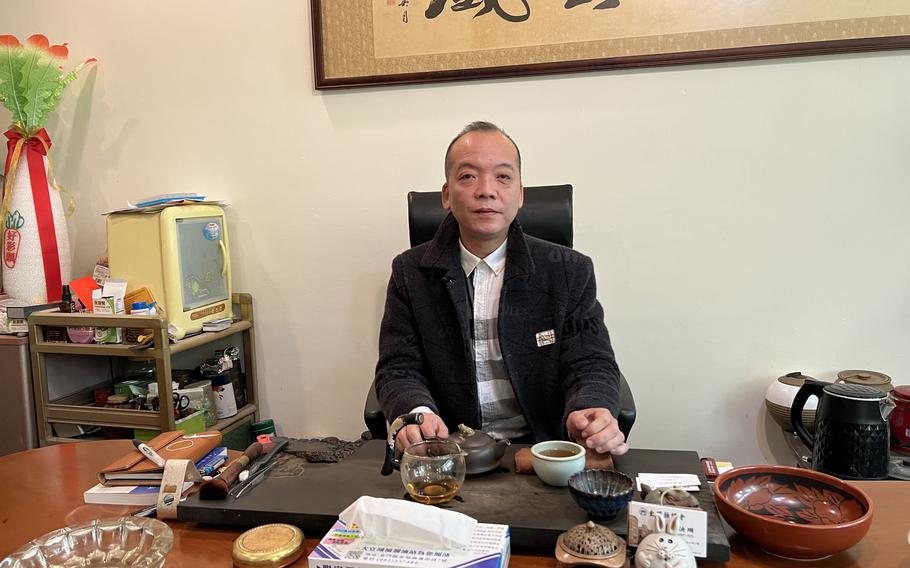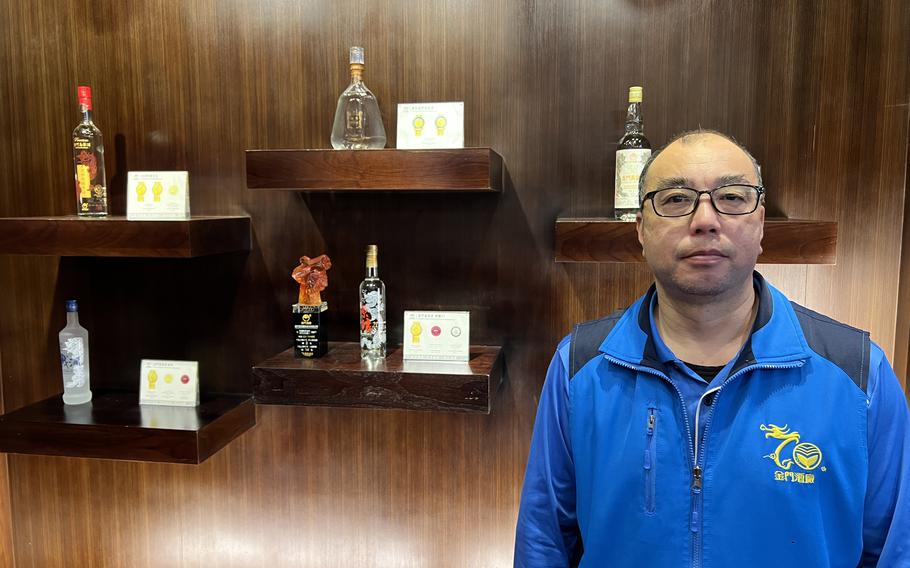Asia-Pacific
Taiwan's freedoms vs. China's money: The dilemma for those in the middle
The Washington Post March 27, 2023

Yu Hong-lin, vice president for technology at Kinmen Kaoliang Liquor Inc., poses for a portrait at the state-owned company’s campus. (Christian Shepherd/The Washington Post)
KINMEN, Taiwan — Growing up on the Taiwanese island of Kinmen, Chen Yang-hu's parents told him about the time a bomb from China's People's Liberation Army hit their family eatery, killing a soldier as he was tucking into a bowl of noodles. Recalling the story, Chen mimes how the projectile filled with propaganda leaflets ripped into the soldier's midsection so that his "whole stomach came out."
These days Chen, now 49 and sporting closely cropped hair with just a hint of gray, is not worried about being disemboweled during lunch. He is one of eight local politicians lobbying for Kinmen to be turned into a "permanent demilitarized zone" as part of a broader plan to ease tensions and bolster trade between the Staten Island-size landmass and China.
"Why not let Kinmen to be an experiment for peace?" asked Chen, who is an independent councilor.
The Chinese city of Xiamen is just four miles across the water from the main Kinmen island — so close a Taiwanese soldier was able to swim to China this month — while Taipei is 204 miles away. And China, with 60 times Taiwan's population, represents a much more lucrative market.
Kinmen has been at the center of the cross-strait standoff since 1949, when the Nationalists established a rearguard here after effectively losing the civil war against the Chinese Communist Party. Over the next four decades, troops used Kinmen as a base to hold off the Communists. To this day, it remains a stronghold of the Nationalist Party, or Kuomintang, although the party now favors closer relations with Beijing.
The Kinmen politicians' "demilitarized zone" proposal last month was met with a mixture of silence, dismissal and suspicion by Taiwan's governing Democratic Progressive Party, which is wary of Chinese influence operations in the outlying islands.
But Chinese state-controlled media seized upon the idea as evidence of progress toward the Communist Party's preferred "resolution to the Taiwan question" — that the 23 million people of the self-governing island democracy submit to its rule without fighting.
Could Kinmen, one state-run outlet asked, become a "trial zone" for "peaceful reunification" to be realized?
From his earliest days as a young official, Xi Jinping has been directly involved in Communist Party work to bring Taiwan, which it views as Chinese territory, under its control. That project has always combined displays of military might with rewards for Taiwanese seen as furthering China's goal of unification.
Now Xi is China's strongest leader in decades, and he has intensified both tactics. He continues to talk about wanting a nonmilitary settlement to differences with Taipei, even as the Chinese military has been practicing encircling Taiwan during drills, and CIA intelligence suggests the People's Liberation Army has been ordered to be ready for a full-scale assault on Taiwan by 2027.
Although Kinmen's proximity to China gives it a view that is not reflective of Taiwanese politics as a whole, the discussion here shows how China could use its economic might to advance its long-standing campaign to win over pockets of Taiwanese society.
It is a campaign that is expected to become more fervent leading up to Taiwan's presidential election in January, when the Kuomintang will be trying to unseat the DPP, and could intensify after Taiwan's President Tsai Ing-wen visits the United States this week. Beijing opposes any interactions between senior Taiwanese and American officials and may respond with another round of military saber-rattling.
But drinking tea in a corrugated iron-walled hut on a quiet country road, Chen brushed aside fears that a buffer zone will undermine democracy on Kinmen, claiming that the proposal — which included support for a bridge to Xiamen and the establishment of a special economic zone with China — was nonpolitical.
For those skeptical of Beijing's motives, the proposal risks undermining Taiwan's hard-won democratic freedoms. Critics have accused its backers of political maneuvering or even acting at China's behest.
Chen denies both charges. The intent was "simple," he insisted: to prevent future bloodshed.
When Xi was the Communist Party boss in Fuzhou city, the capital of China's Fujian province, he learned to how to dangle closer economic, personal and transport linkages while also using escalating military threats as a backstop against Taiwan declaring formal independence.
In 1996, Xi called for stronger national defense that "can overcome hardships no matter how great," according to one article in the official Fujian Daily newspaper, now yellow with age and stored in an archive maintained by Taiwan's Ministry of Justice.
On the same page, another article relayed Xi's remarks about the need to attract Taiwanese investment for large projects in Fujian.
The dual approach Xi took then — speaking softly about being one big family while brandishing an ever-larger stick — continues.
China "continues to warn that if its red lines are crossed, there is the possibility that it will have to use force," said Bonnie Glaser, director of the Asia Program at the German Marshall Fund of the United States. "It's essentially trying to put the onus on other countries, both the United States and Taiwan."
Although Xi has adopted more strident nationalist rhetoric about the need to defend Chinese sovereignty, he has never fundamentally changed China's proposal for Taiwan, which is the same "one country, two systems" formula created during the handover of Hong Kong from British colonial rule.
A messy conflict in the Taiwan Strait would have "huge blowback on Xi Jinping's position at home and potentially even call into question the legitimacy of Chinese Communist Party rule, as well as setting back Xi Jinping's highest priority, which is the achievement of national rejuvenation," Glaser said.
Some fear that Xi wants taking control of Taiwan to be the centerpiece of his personal legacy, but that view is contested. He tends to only speak about China's "complete unification" in relation to a long-term goal of "national rejuvenation" by the middle of the 21st century — a project he inherited from his predecessors.
Glaser interprets this as a choice to kick the can down the road, leaving the final decision up to his eventual successor. "Xi is not going to be China's leader in 2049," she said of the 69-year-old.
On Kinmen, there is some evidence that Xi's promises of economic largesse can weaken Taiwan's resolve to remain separate from China. From the island's northeastern tip, tourists watch through binoculars as dredging ships reclaim land for a new Chinese airport set to open in 2025, promising quick access to international travel for Kinmen residents.

Yu Hong-lin, vice president for technology at Kinmen Kaoliang Liquor Inc., poses for a portrait at the state-owned company’s campus. (Christian Shepherd/The Washington Post)
One symbolic example comes from the island's most important industry. Kaoliang liquor, a clear sorghum-based spirit, was first made in the 1950s as a way for soldiers to keep up morale as they repelled Communist attacks.
Despite the company's anti-Communist history — it still sells bottles commemorating Chiang Kai-shek, the controversial Nationalist who led the retreat to Taiwan — the idea of fending off China is far from the minds of executives today.
They are keen to increase sales of Taiwan's most famous hard liquor to buyers in China, where the drink is known as baijiu. China briefly suspended imports of the spirit, alongside more than 100 Taiwanese beverages, late last year after then-House Speaker Nancy Pelosi visited.
Kinmen Kaoliang Liquor Inc.'s vice president Yu Hong-lin, sitting at the company's sprawling production facilities, a thimble of the clear spirit on the table beside him, said the company needed to put business first.
"Frankly speaking, the market in Taiwan is almost fully saturated," he said. "The largest market for Chinese baijiu is still in mainland China. … So of course that is our goal."
While Taipei may focus on trying to understand the intention and political consequence of interacting with Beijing, the residents of Kinmen merely want the economic benefits of greater connectivity, said Lu Cheng-Fung, an associate professor at National Quemoy University on Kinmen. "Local people are very pragmatic," he said.
But business and politics are often intertwined, as is the case with the demilitarized zone proposal, which would require a high-level agreement between Beijing and Taipei to become reality. "It's unlikely this could be a truly feasible policy direction," Lu said, but he added that the idea of trying to ease tensions "will definitely be politically attractive."
That appeal could become a part of broader positioning by Taiwan's two major parties ahead of the presidential election in January. The Kuomintang has already begun to present itself as the party of peace while framing the DPP as being liable to provoke China.
Yet, even in Kinmen not everyone is sold on the buffer zone proposal.
"You can't decide whether someone will attack you," said Tung Sen Po, an independent councilor who has spoken out against stronger ties with China. "Should they consider it necessary to launch a war, then they will take you if they want to. That's the cruel fact of the matter."